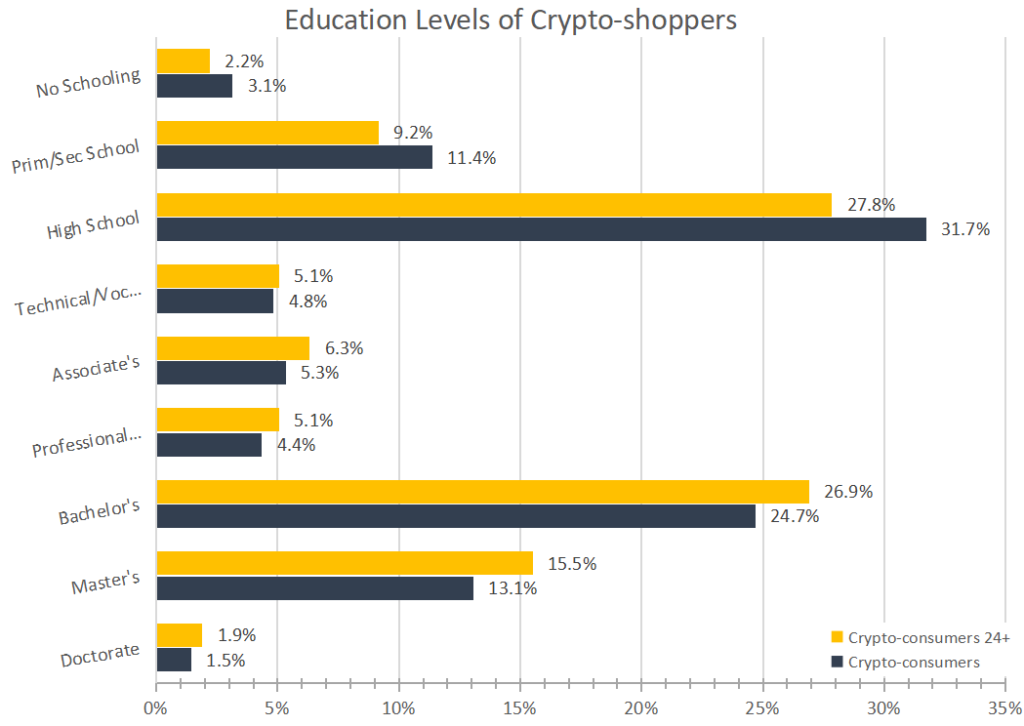Education and crypto-shopping: A remarkable correlation revealed
By Umut Can Çabuk, Ph.D.
As of 2022, the median education level of crypto-consumers is at a high school degree. This divergence from the world average (roughly at a secondary school degree) indicates that higher education plays a significant role in enabling participation in crypto-shopping. The chart presents a breakdown of the education levels of all crypto-shoppers and those at least 24 years old. We see in the chart that more than a quarter of crypto-consumers aged 24 or older hold a bachelor’s degree, more than 15% hold a master’s degree, and nearly 2% hold a doctorate, which sums up to a whopping 44%, meaning that almost half of the crypto-consumers attended university at least for four years. Yet, including the ones with a shorter higher education (i.e., having an associate’s degree or professional degree), this ratio reaches 55%.

But why is there such a correlation? First, using cryptocurrencies for transactions necessitates familiarity with certain computer and internet skills, often cultivated through higher education. Language proficiency, particularly in English, is crucial in this global digital market. Additionally, those with advanced degrees are more likely to be exposed to blockchain-related projects in their professional or academic pursuits. Such exposure can encourage them to integrate crypto-shopping into their everyday lives. Finally, higher education levels generally correspond to lower unemployment rates across the globe, meaning these individuals may have more resources to delve into the world of crypto-shopping.
Of course, these statistics don’t mean crypto-shopping is only for the highly educated. But they indicate a noteworthy trend: Education can be a valuable key, unlocking doors to understanding and participating in this innovative form of commerce. Furthermore, it’s important to highlight the changing demographics as we look at older age brackets. Among adults 24 years or older, the proportion of those with no schooling drops to 2.2% from 3.1%, and primary/secondary school as the highest level drops to 9.2% from 11.4%. In this group, the percentage of individuals holding degrees higher than a high school diploma also increases. This points to a promising future for crypto-shopping as an increasingly educated population comes of age.
In conclusion, crypto-shopping isn’t an abstract or distant concept; it’s a growing reality. As education levels rise, so does engagement with this exciting new mode of e-commerce. By fostering digital literacy, computer skills, and exposure to blockchain, education has the power to shape the future of crypto-shopping. The future looks bright but firmly grounded in the here and now. Embracing the role of education in this sphere can only accelerate our journey into this promising new frontier.
About Cryptorefills
CryptoRefills is on a mission to enable people all over the world to spend bitcoin and other cryptocurrencies for their everyday needs. With CryptoRefills, people from over 150 countries and territories can top up their mobile credit and buy gift cards with bitcoin and other crypto from the world’s largest digital and retail brands. As one of the earliest adopters of the Bitcoin Lightning Network, and as the first company in the world to launch Ethereum layer-2 payments (via Polygon Matic and Arbitrum) and fast finality blockchains (via Avalanche and Fantom) for Ecommerce payments, CryptoRefills is leading the innovation in applied decentralized payments and developing new technologies for the gift card industry.
The Company is also very active in researching and educating on consumer spending of cryptocurrency in retail through its Labs initiative and publishes an annual report on the global use of crypto for purchasing goods and services. CryptoRefills is a fast-growing fintech, headquartered in Amsterdam, and a proud member of the Holland Fintech Association and Blockchain Netherlands Foundation.
Website | Twitter | LinkedIn | For information and press enquiries: media@cryptorefills.com
For information concerning CryptoRefills research and annual report on consumer spending of cryptocurrency in retail: https://labs.cryptorefills.com/
